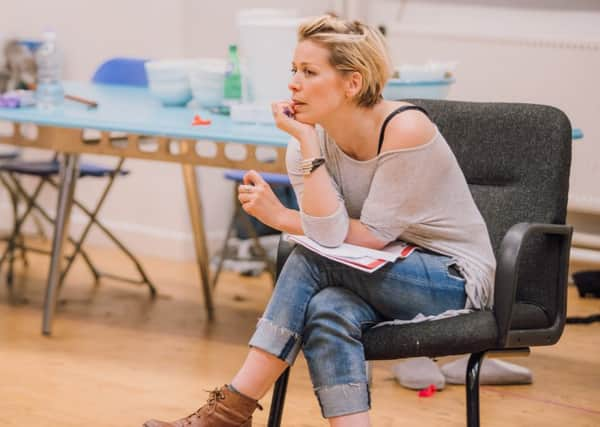Ones to watch in 2017 - director Cora Bissett


Cora Bissett literally can’t remember when she first started making theatre. She was a little girl growing up in Glenrothes in the 1970s and early 80s, and there was no theatre tradition in the family, although her mum loved to sing. And yet there she was, inviting the neighbours, getting her little friends to help with the scenery, putting on shows. “It wasn’t that I wanted to be a star,” says Bissett, drinking tea in a Glasgow hotel lounge with the same gusto she brings to every other aspect of life. “It was just the making of it that I loved, the putting shows together – it seems to have been a part of me right from the start.”
And now, almost 40 years on, Bissett has developed that vital part of herself into a career in theatre – first as an actor, and then as a director and producer – that has acquired a stellar quality all of its own. During 2017, she will not only be masterminding the latest tour of her smash-hit musical Glasgow Girls, the Amnesty award-winning true story of six Glasgow teenagers who decided to campaign to protect their asylum-seeker classmates from being deported, she’ll also be directing the first-ever stage version of Emma Donoghue’s acclaimed novel Room, in which a kidnapped, imprisoned and abused young woman raises her little son to see their 12-foot-square cellar room as a whole world of beauty and love. The project, with music by Kathryn Joseph, is a flagship co-production between the Theatre Royal Stratford East, the Abbey in Dublin, and the National Theatre of Scotland, where Bissett is an associate director.
Advertisement
Hide AdThen, in August, Bissett will be at the Traverse with a National Theatre of Scotland double bill called Eve/Adam, about the experiences of two transgender people. And all this on top of spending as much time as possible with her beautiful year-old daughter Naia. “People often say their life changes completely when they have a child,” says Bissett, “but so far, I haven’t actually found that. Up to now, it’s mainly that I do what I would have been doing anyway, and she comes along too – which is great.”
Perhaps, though, the underlying reason why Bissett has found this transition relatively painless lies in her 25 years of sustained effort, since she left school in 1991, to create a working life that truly reflects her own priorities. In her late teens, her main performing impulse lay in music; with three school friends, she formed an indie band called Darlingheart which scored a sudden success, winning a major recording contract, and heading out on tour with bands like Radiohead and Blur.
After a couple of years, though, the band ended in an all-too-familiar story as the record label unceremoniously dropped them; and from that moment, Bissett resolved always to be in charge of her own career, to do her own thing, and to manage her own projects. In 1993, she went to the RSAMD to study for a BA in theatre; she also launched a new and more edgy female band called Swellin’ Meg. “The songs started to get a bit sharper,” she says, “a bit more politically aware.” And after she graduated in 1997, she spent a decade developing a successful career as an actor in Glasgow and London, appearing at the Royal Lyceum, and in the Traverse’s small-scale international smash hit, Midsummer; she also did her share of television, in shows like High Times, Taggart and River City.
She felt increasingly frustrated, though, by the limited range of roles available for women; and when she returned to Scotland in 2007, she began a process of developing her own projects which suddenly broke through to international recognition during the Edinburgh Festival of 2009, when her terrific site-specific show Roadkill, about the trafficking of young women for prostitution, won almost every award going, and began a long journey across the cities of the world, including London, where it picked up an Olivier Award. By this time, Bissett was already working with Glasgow’s migrant and refugee communities, both as an artist and as a citizen; and the stories she heard led not only to Glasgow Girls, but also to Bissett’s powerful and subtle 2015 National Theatre of Scotland show, Rites, about female genital mutilation.
“I do feel that the need to tell women’s stories, in their own voices, is one of the main driving forces for me,” says Bissett. “And of course, that leads on to other areas where people are dehumanised or silenced. As an actress, you see a lot of inequality, in your working life; you’re living it, from day to day. But I was always also thinking about these issues in terms of the wider global picture.
“Do I think of my work as something that might change the world? Well, I’m not arrogant enough to think any piece of theatre will make a huge difference. And I’m not consciously doing agitprop in the 7:84 and Wildcat tradition; I think it’s more that it’s something in the DNA of Scottish theatre, the need to link theatre to popular culture and music, and to appeal to a wider audience.
Advertisement
Hide Ad“What I do feel, though, is that just as you can partly overcome feelings of powerlessness about the world by doing something practical – giving a room to an asylum-seeker, or making up parcels for refugees – then you can also do your bit my making work that gives people a voice, and shows the humanity of people who are often treated as less than human. It’s that thing about being the change you want to see. And if that helps to move things in the right direction, even slightly, then for me it’s worth doing, whether it’s theatre or film or whatever, I can’t see myself ever really wanting to do anything else.”